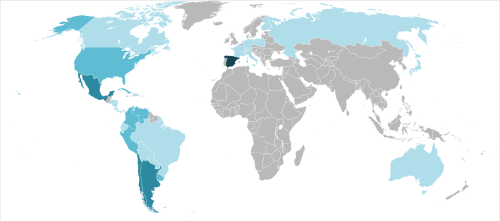(This is the ninth installment in a series of updates from the WikiHistories summer research fellows, who will be studying the virtual community history of different Wikipedia editing communities.)
Before our project came along there was already a great deal written about Wikipedia, including a significant number of academic studies. But a lot of it has seemed to focus either on the English-language site (by far the largest) or on Wikipedia in aggregate. One of the exciting aspects of the Virtual Community History project is that it will allow for a focus on editor communities other than English speakers, both large (Spanish) and smaller (Tagalog, Armenian, etc).
In reviewing some of the discussions on the Spanish-language site, and having started the process of interviewing editors, I’ve developed an interest in the dynamics of conflict and conflict resolution in Spanish-language Wikipedia. One could look at this question from many angles, but I’m interested in the area of language usage, broadly speaking — what you might call “fights over words.” This is an issue that various interview subjects have already pointed out to me, and is already a topic of discussion among Spanish-speaking editors.

Currently Spanish is spoken in 20 geographically dispersed countries (and Spanish Wikipedia is produced by people in even more of course). Broadly speaking, they share a common language and a common cultural inheritance. Nonetheless, Spanish-speaking regions and nations also have very distinctive histories, cultures, and forms of language usage, all of which are reflected in the Wikipedia editor community, and affect the production of the encyclopedia.
This may seem like a fairly humdrum observation at first: after all, English Wikipedia is also produced by editors from the United States, Canada, New Zealand, Australia, Ireland, the UK, as well as by English speakers all over the world. However, my sense is that the Spanish-language Wikipedia community has a different (and perhaps more contentious) experience of national and linguistic diversity than the English-language one.
And so this is one issue one I want to look into further: the conflicts that arise around this sort of diversity, and how the Wikipedia community responds to them. The interviews already have questions related to this topic, and will also help point me to particular cases on the site for closer reading. There are various questions of interest here: In what cases do these debates arise? How are conflicts over “local” versus more “universal” usage resolved? What kind of authority or justification is invoked to justify either option? Are nationalism or cultural particularism ever in play? And how does all this differ from the English-language site? (I hope to do some comparative analysis where possible.)
Historically, when it comes to disputes over the Spanish language, the standard reference, or authority, is is the Diccionario de la Real Academia Española (DRAE), first produced in 1780 and now accessible on the internet in its 22nd edition. As the title indicates, it is produced by the Real Academia Española (the Royal Spanish Academy), the mother of all language academies for Spanish. Also important is the Diccionario panhispánico de dudas (DPD, The Panhispanic Dictionary of Questions), a collaborative work produced by the 22 different Spanish-language academies worldwide, and also available on-line. Both sources are frequently referenced in Wikipedia debates, albeit to the dismay of those who question their position of authority over the Spanish language.
A couple of simple examples may help clarify what kinds of debates I’m referring to. One case is the occasional discussion over the spelling of Mexico, for example. Should it be “México” (the Mexican, and Latin American usage) or should “Méjico” (a usage more commonly found in Spain) be allowed? The latter usage (“Méjico”) was often employed to refer to Mexico before that country’s independence (it was also formally known as New Spain). The DRAE and DPD both favor “México,” but advocates for “Méjico” will still surface. Among Latin Americans, however, and especially Mexicans, the latter usage has a marked colonial flavor, and is often strongly objected to.
Another question concerns the term that should be used for the Spanish language itself: is it “español,” or is it “castellano,” that is, Castilian, in reference to the geographic region of origin of the present-day Spanish language? The DRAE and DPD regard the former as standard, without excluding the latter. In Latin America the usage varies by country and region, although “español” is generally regarded as more universal. In Spain, however, this question has a political connotation. For members of language minorities, Spain is a country in which various languages are spoken: castellano (Castilian, a.k.a. Spanish), euskera (Basque), catalán (Catalan), and gallego (Galician). From this perspective, to designate one of Spain’s languages as “español” is considered politically problematic by some.
There are various other examples of this sort. The question I’m interested in is not whether “castellano” or “español” is correct per se, but rather why such questions are important to Wikipedia editors, and how they are addressed and (perhaps) resolved. The goal is that through issues like these, and others related to language use (like conflicts over civismo and etiqueta), we can hopefully learn more about the dynamics of the community and its approach to conflict and conflict resolution.
Stuart Easterling
WMF Virtual Community History Fellow

Can you help us translate this article?
In order for this article to reach as many people as possible we would like your help. Can you translate this article to get the message out?
Start translation